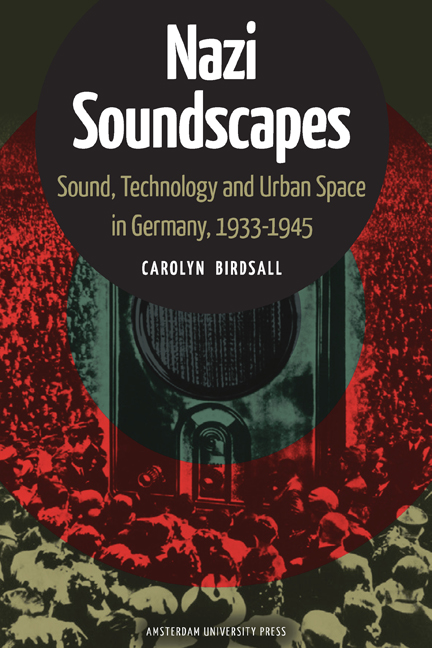3 - Mobilising Sound for the Nation at War
Published online by Cambridge University Press: 20 January 2021
Summary
The specific contribution of sound to cultural expressions of modern national identity has been emphasised in recent scholarship (see Revill 2000; Connell and Gibson 2003; Biddle and Knights 2007). This interest in how the nation is performed through sound and music has underscored how such practices are produced spatially. The intersections of (national) identity and cultural geographies can even reflect an “aural border” that delimits acoustic identities in a particular geopolitical area (Kun 2000). In the case of Germany, its nationalism since the nineteenth century had been particularly dependent on such a process. As George Mosse argues, “ritual, songs, and national symbols were used to shape the crowd into a disciplined mass in order to give it direction and maintain control” (1975: 2). Building on such narratives, the previous two chapters concentrated primarily on the role of sound in the reworking of identity patterns and the production of space under National Socialism, with a particular stress on the first five years of the regime. I also emphasised the efforts to produce conducive modes of attentive listening in both urban public space and domestic radio reception. In what follows, I will account for the intensified use of radio for nationally-syndicated programming and the conception of broadcasting as a “cultural front” following the outbreak of war in September 1939. As such, this chapter is particularly concerned with the attempts to produce and maintain an ideal of the “imagined community” (Anderson 1991), as harnessed through the timing of radio broadcast announcements and pursued in the spatial organisation of the urban home front with alarm systems and acoustic forms of surveillance.
The first important aspect in this investigation of the wartime soundscape concerns the use of radio to manipulate listening attention, interrupt usual radio routines and stage a mediated experience of national celebration. In order to sketch out the imaginative space promoted for radio, I will examine the case of an irregular, yet much-anticipated radio event in Germany during World War II. Special announcements (known as Sondermeldungen) were surprise interruptions to the normal broadcast schedule, ranging between twenty seconds and twenty minutes in length, which were used to deliver important announcements from the German military between 1939 and 1945. Despite the large amount of research about radio propaganda during the Nazi period, no serious attention has been given to these Sondermeldungen.
- Type
- Chapter
- Information
- Nazi SoundscapesSound, Technology and Urban Space in Germany, 1933–1945, pp. 103 - 140Publisher: Amsterdam University PressPrint publication year: 2012



